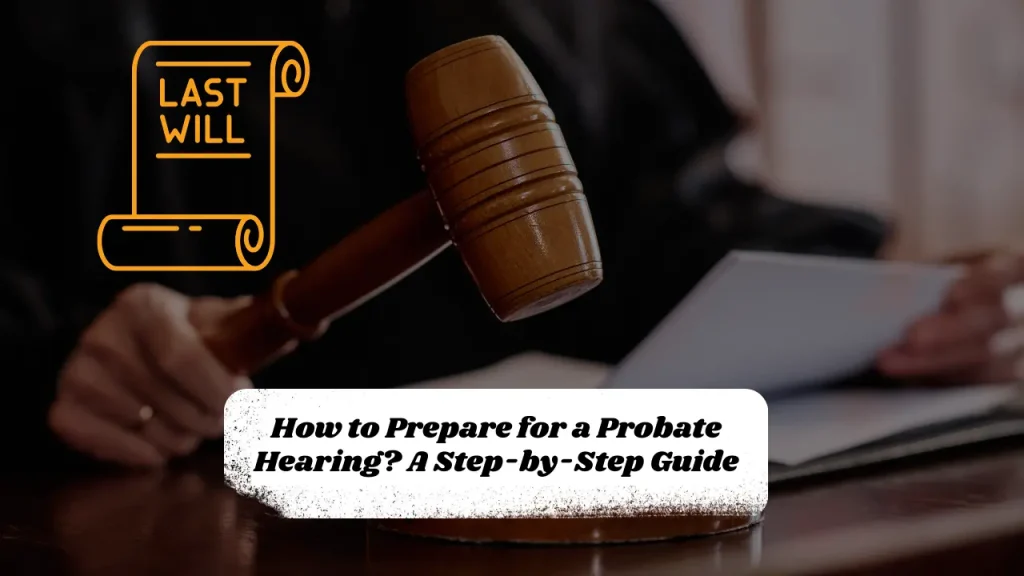How to Prepare for a Probate Hearing? A Step-by-Step Guide
Are You Ready for Your Probate Hearing? A probate hearing is a critical step in settling an estate, but 60% of executors face delays due to avoidable errors like missing documents or unresolved debts. Whether you’re an executor, beneficiary, or interested party, preparation is key to avoiding costly setbacks. Follow this expert guide to ensure a smooth process.
What Is a Probate Hearing?
A probate hearing is a court proceeding where a judge:
- Validates the deceased’s will (if one exists).
- Appoints an executor or administrator.
- Oversees asset distribution, debt repayment, and tax compliance.
Governed by state laws (e.g., California Probate Code § 8000), the hearing ensures legal requirements are met. Missing deadlines or documents can delay the process for months—or even years.
Key Steps to Prepare for a Probate Hearing
1. Gather Essential Documents
Probate courts require precise paperwork. Collect:
- Original will (lost wills may invalidate probate under UPC § 2-502).
- Death certificate (certified copy).
- Petition for probate (e.g., Form DE-111 in California).
- Asset inventory (bank statements, deeds, retirement accounts).
- Debt list (credit cards, mortgages, medical bills).
- Notices of hearing sent to heirs/creditors.
Statistic: 30% of delays stem from incomplete asset disclosures.
2. File the Petition Correctly
Submit a petition for probate in the deceased’s county within state deadlines (e.g., 30–90 days post-death in many states).
- Include a Petition for Letters Testamentary (grants executor authority).
- Pay filing fees (
- 50–
- 50–1,000, depending on estate size).
Example: California Probate Code § 8000 mandates filing before administering an estate.
3. Notify Heirs and Creditors
Legally required notices prevent disputes:
- Heirs: Notify even disinherited parties via certified mail.
- Creditors: Publish a notice in a local newspaper (e.g., Texas Estates Code § 308.002 requires creditor notification within one month).
4. Attend the Hearing and Present Your Case
Be prepared to:
- Answer the judge’s questions about asset valuations or will validity.
- Provide witnesses or appraisals if the will is contested.
- Demonstrate compliance with notice requirements.
If no objections arise, the judge will issue Letters Testamentary or Letters of Administration.
5. Follow Post-Hearing Instructions
After probate is granted:
- Settle debts and taxes (federal estate taxes apply to estates over $13.61 million in 2024).
- Distribute assets per the will or state intestacy laws (e.g., California Probate Code § 6400).
Related article for you:
How to Prepare for a Probate Hearing as an Heir? An Essential Guide

Common Mistakes to Avoid
- Missing filing deadlines: Delays the entire process.
- Incomplete notifications: Risks legal disputes with heirs/creditors.
- Ignoring state laws: Bond waivers, publication rules, or forms vary by jurisdiction (e.g., Form DE-111 in California).
- Overlooking debts/taxes: Failure to pay liabilities may trigger penalties.
FAQs: Quick Answers to Critical Questions
How long does probate take?
Typically 6–18 months; complex estates or disputes can extend this to 2+ years.
Can I avoid probate?
Yes. Use living trusts, joint ownership, or payable-on-death accounts.
What if someone contests the will?
The judge evaluates claims (e.g., fraud, undue influence). Valid claims may invalidate the will.
How much does probate cost?
Costs average 3–8% of the estate value. In California, it’s ~4% of the first $100,000.
Can I represent myself?
Yes, but 45% of self-represented executors face compliance issues.
Where to Get Help
- Legal Aid: Local bar associations (e.g., ABA Free Legal Answers).
- Online Tools: FindLaw Probate Guide or state court websites.
- Estate Attorneys: Specialists in state codes (e.g., Texas Estates Code § 201.001).
Final Thoughts: Take Action Now
Don’t gamble with probate compliance. Book a 30-minute consultation with a certified probate attorney today to secure your rights, avoid disputes, and ensure assets transfer smoothly.
Need expert guidance? Click here to find a probate lawyer near you.
Sources: American Bar Association, Uniform Probate Code, California Probate Code § 8000, Texas Estates Code § 308.002.
About the Author

Sarah Klein, JD, is an experienced estate planning attorney who has helped clients with wills, trusts, powers of attorney, and probate matters. At All About Lawyer, she simplifies complex estate laws so families can protect their assets, plan ahead, and avoid legal headaches during life’s most sensitive moments.
Read more about Sarah
